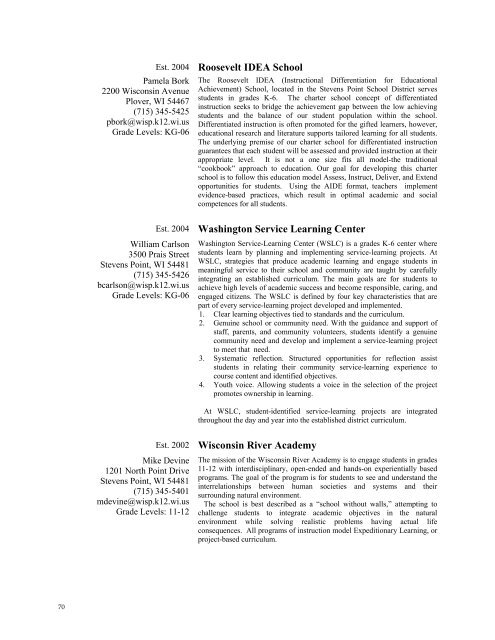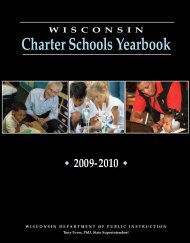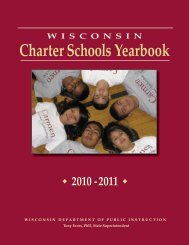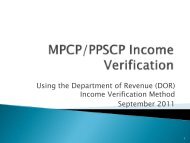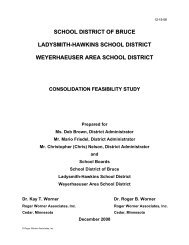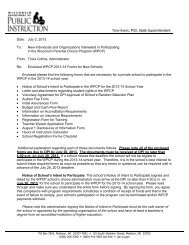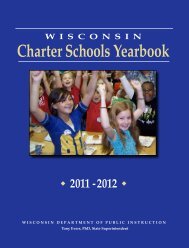Wisconsin Charter Schools Yearbook - School Management Services
Wisconsin Charter Schools Yearbook - School Management Services
Wisconsin Charter Schools Yearbook - School Management Services
Create successful ePaper yourself
Turn your PDF publications into a flip-book with our unique Google optimized e-Paper software.
70<br />
Pamela Bork<br />
2200 <strong>Wisconsin</strong> Avenue<br />
Plover, WI 54467<br />
(715) 345-5425<br />
pbork@wisp.k12.wi.us<br />
Grade Levels: KG-06<br />
William Carlson<br />
3500 Prais Street<br />
Stevens Point, WI 54481<br />
(715) 345-5426<br />
bcarlson@wisp.k12.wi.us<br />
Grade Levels: KG-06<br />
Mike Devine<br />
1201 North Point Drive<br />
Stevens Point, WI 54481<br />
(715) 345-5401<br />
mdevine@wisp.k12.wi.us<br />
Grade Levels: 11-12<br />
Est. 2004 Roosevelt IDEA <strong>School</strong><br />
The Roosevelt IDEA (Instructional Differentiation for Educational<br />
Achievement) <strong>School</strong>, located in the Stevens Point <strong>School</strong> District serves<br />
students in grades K-6. The charter school concept of differentiated<br />
instruction seeks to bridge the achievement gap between the low achieving<br />
students and the balance of our student population within the school.<br />
Differentiated instruction is often promoted for the gifted learners, however,<br />
educational research and literature supports tailored learning for all students.<br />
The underlying premise of our charter school for differentiated instruction<br />
guarantees that each student will be assessed and provided instruction at their<br />
appropriate level. It is not a one size fits all model-the traditional<br />
“cookbook” approach to education. Our goal for developing this charter<br />
school is to follow this education model Assess, Instruct, Deliver, and Extend<br />
opportunities for students. Using the AIDE format, teachers implement<br />
evidence-based practices, which result in optimal academic and social<br />
competences for all students.<br />
Est. 2004 Washington Service Learning Center<br />
Washington Service-Learning Center (WSLC) is a grades K-6 center where<br />
students learn by planning and implementing service-learning projects. At<br />
WSLC, strategies that produce academic learning and engage students in<br />
meaningful service to their school and community are taught by carefully<br />
integrating an established curriculum. The main goals are for students to<br />
achieve high levels of academic success and become responsible, caring, and<br />
engaged citizens. The WSLC is defined by four key characteristics that are<br />
part of every service-learning project developed and implemented.<br />
1. Clear learning objectives tied to standards and the curriculum.<br />
2. Genuine school or community need. With the guidance and support of<br />
staff, parents, and community volunteers, students identify a genuine<br />
community need and develop and implement a service-learning project<br />
to meet that need.<br />
3. Systematic reflection. Structured opportunities for reflection assist<br />
students in relating their community service-learning experience to<br />
course content and identified objectives.<br />
4. Youth voice. Allowing students a voice in the selection of the project<br />
promotes ownership in learning.<br />
At WSLC, student-identified service-learning projects are integrated<br />
throughout the day and year into the established district curriculum.<br />
Est. 2002 <strong>Wisconsin</strong> River Academy<br />
The mission of the <strong>Wisconsin</strong> River Academy is to engage students in grades<br />
11-12 with interdisciplinary, open-ended and hands-on experientially based<br />
programs. The goal of the program is for students to see and understand the<br />
interrelationships between human societies and systems and their<br />
surrounding natural environment.<br />
The school is best described as a “school without walls,” attempting to<br />
challenge students to integrate academic objectives in the natural<br />
environment while solving realistic problems having actual life<br />
consequences. All programs of instruction model Expeditionary Learning, or<br />
project-based curriculum.


